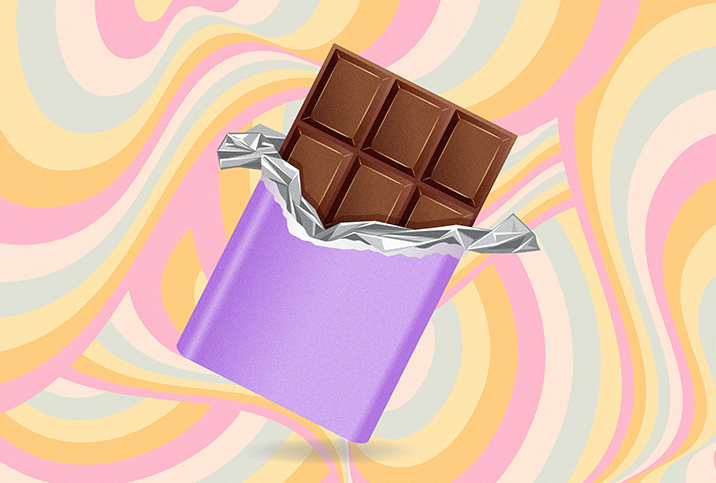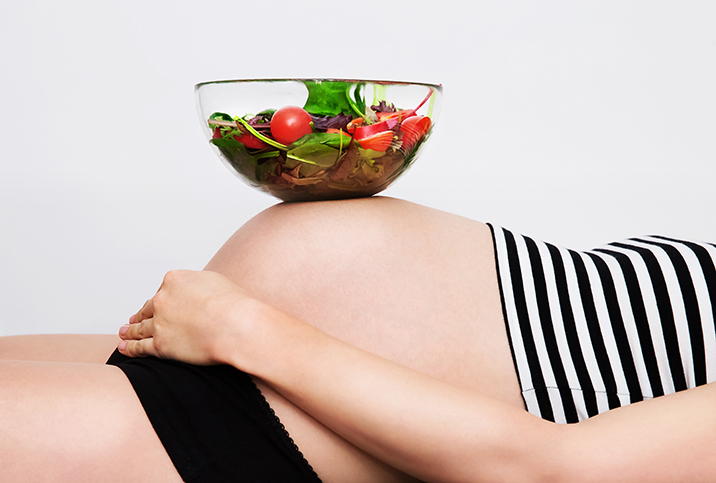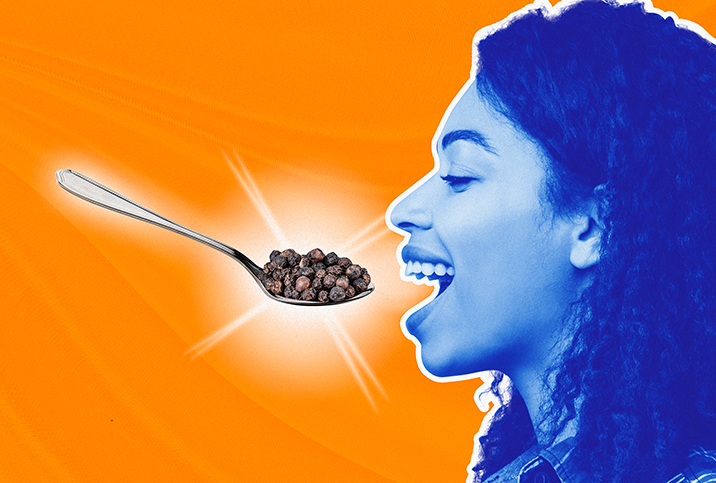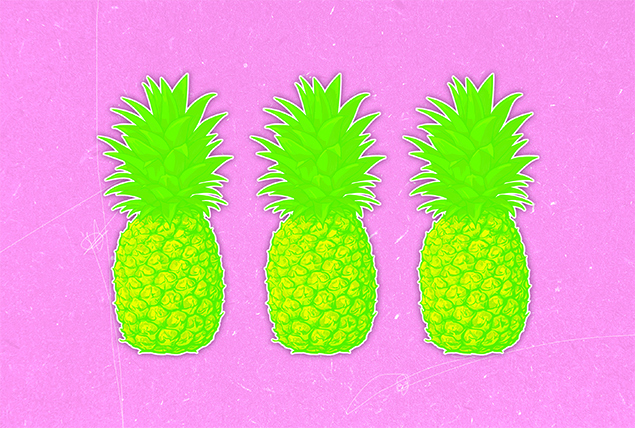Can I Eat Chocolate While Pregnant?
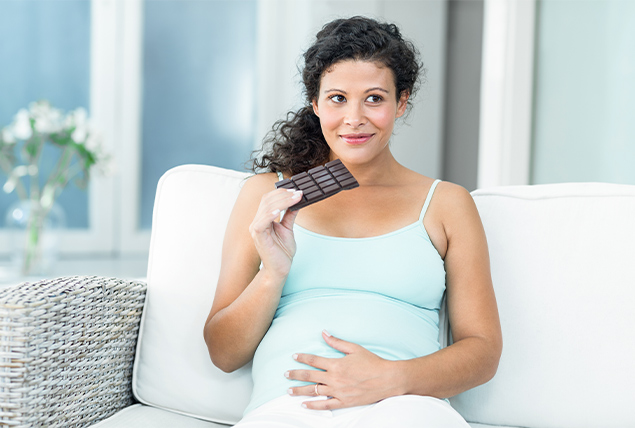
Pregnancy cravings can run the gamut, from pickle juice or peanut butter to hot sauce or ice cream on toast. One of the most common pregnancy cravings is chocolate—and not only because it's delicious.
Why do some women crave chocolate while pregnant?
Chocolate contains phenylethylamine and tryptophan, two chemicals that may activate reward centers in the brain, boosting the production of "happy hormones" such as dopamine and serotonin.
This sweet treat also contains theobromine, a compound found in coffee that can enhance energy and focus, according to Kristin Mallon, C.N.M., a registered nurse certified-inpatient obstetric nursing and the co-founder and CEO of FemGevity in New York City. Plus, it's rich in vitamins, minerals and antioxidants, which may benefit various aspects of health, according to Cleveland Clinic.
Despite all that, chocolate has downsides. If you're craving chocolate during pregnancy, here's what you need to know.
Can you eat chocolate while pregnant?
Ultra-processed foods can affect fetal growth and development, but what about chocolate? Despite potential benefits, chocolate—even the minimally processed kind—can contain ingredients that could put pregnant people and babies at risk.
Researchers tested 28 bars from various brands in the 2022 Consumer Report (CR). For 23 chocolate brands, 1 ounce contained levels of cadmium, lead or both that public health authorities have deemed potentially harmful for adults.
Consistent, long-term exposure to small amounts of these heavy metals can lead to various health issues, Kevin Loria wrote in Consumer Reports.
'It's OK to have a piece of chocolate every so often, but I would not recommend eating chocolate daily.'
The threat is even greater for pregnant people and young children because exposure can adversely affect brain development, among other problems, said Tunde Akinleye, the Consumer Reports food safety researcher who led this testing project, in an interview with Loria.
The Consumer Reports study wasn't peer-reviewed, but it did reflect previous research, such as a 2018 comprehensive study by the Food and Drug Administration (FDA).
Despite this, you don't have to swear off chocolate because five of the bars tested reportedly had low heavy metal levels, suggesting they're safe in moderation.
Some kinds of chocolate are likely to contain fewer contaminants than others, said Karen Toubi, D.O., an OB-GYN at Rodeo Drive Women's Health Center in Beverly Hills, California.
Can you drink hot chocolate while pregnant? What about chocolate milk?
It's generally safe to drink a moderate amount of hot chocolate or chocolate milk during pregnancy. Avoid excessive caffeine or artificial sweeteners, though. Choose chocolates made with pasteurized milk.
Can hot chocolate cause miscarriage? It's a rumor. Hot chocolate is unlikely to cause a miscarriage in expectant mothers. Overindulging could increase the risk of complications, however, if you consume an abundance of caffeine.
There's uncertainty about caffeine's impact on pregnancy. Some data suggests high caffeine intake—greater than 200 milligrams a day—can increase the risk of miscarriage, congenital disabilities, preterm delivery and low birth weight, according to Adi Davidov, M.D., an OB-GYN and the associate chair of obstetrics and gynecology at Northwell Staten Island University Hospital in New York City.
Generally, hot chocolate contains between 5 mg and 10 mg of caffeine per cup, said Michael Green, M.D., an OB-GYN in Lake Arrowhead, California, and a co-founder at Winona, a telehealth company offering menopause care.
Chocolate milk and decaf hot chocolate typically contain less caffeine. Again, it's about moderation to maintain good health in pregnancy.
Is dark chocolate good for pregnancy?
Dark chocolate is linked to several health perks, such as boosting people's mood, according to a 2019 study. Further studies could help elaborate on dark chocolate's potential positive effects on heart health—something that may benefit pregnant and non-pregnant women.
Some data suggests it could reduce the risk of preeclampsia (more on that later).
"Dark chocolate can offer some health benefits during pregnancy, as it contains beneficial antioxidants and minerals like iron, magnesium and zinc," said Himali Maniar, M.B.B.S., an OB-GYN at Nisha Women's Hospital and IVF Centre and associated with ClinicSpots in South Bopal, Ahmedabad, India. "Eating small amounts of dark chocolate—one or two squares per day—has been linked to improved heart health and reduced stress levels, both of which are important while pregnant."
However, there could be a downside to dark chocolate. Potential side effects from consuming dark chocolate during pregnancy can occur—primarily if you eat too much.
Since dark chocolate contains more cacao solids, it tends to have more caffeine, Davidov said.
It's also more likely to contain trace metals such as cadmium or lead.
Is dairy milk chocolate safe for pregnancy?
Similar to hot chocolate and chocolate milk, milk chocolate is generally considered safe to eat in moderation, Davidov said. However, while milk chocolate usually contains less caffeine and is less likely to contain heavy metals than dark chocolate, it's not entirely risk-free.
Milk chocolate tends to be high in sugar, which could be detrimental during pregnancy—particularly for people who are pre-diabetic or diabetic.
What should you know about chocolate during pregnancy?
Not all chocolate is created equal. Every type of chocolate has its drawbacks, which may include high lead levels, caffeine and calories.
High lead levels
Chocolate products often contain trace amounts of heavy metals. Some chocolates include more than trace amounts of lead, which can be particularly hazardous to fetuses and young children.
Why does chocolate contain lead? Trace amounts of heavy metals are found in various foods—sweet potatoes, rice and sunflower seed butter, to name a few. Contaminated water and soil used to grow the crops are usually to blame, Maniar said.
As a result, the more cacao solids a product contains, the more likely it is to be contaminated. There's no surefire way to know if a heavy metal level is safe, Davidov said.
Some products contain lower levels than others, however. Organic or other certifications don't necessarily indicate anything about lead or cadmium content. Lighter chocolates are usually a safer bet.
Caffeine
Generally, chocolate's caffeine content is low, likely making it OK to consume in moderation. Don't exceed the total 200 mg a day limit—equivalent to about two eight-ounce cups of coffee, Davidov said.
Caffeine content can vary significantly from one product to another, Maniar said. Dark chocolate contains between 12 mg and 23 mg per ounce, depending on the amount of cacao solids, according to the U.S. Department of Agriculture.
Milk chocolate containing 20 percent to 30 percent cacao solids contains about 6 mg of caffeine per ounce. White chocolate—it has no cacao solids—is caffeine-free but much higher in sugar, according to the National Institute of General Medical Sciences.
Check the product label or contact the manufacturer to see where your favorite chocolate stands.
Calorie counts
Chocolate products are usually high in sugar and calories. While eating a small portion is fine, overindulging could increase your risk of weight gain, gestational diabetes and preeclampsia.
Calorie recommendations vary depending on your pre-pregnancy body mass index, trimester and how many fetuses you're carrying. Doctors generally recommend eating a balanced diet and consuming between 2,200 and 2,900 calories per day, Davidov said, adding that limiting carbohydrates to between 250 and 300 grams is also recommended.
Consuming excess calories and sugar could raise your likelihood of gestational diabetes, among other complications.
It's best to ensure your chocolate consumption is, at most, 10 percent of your total caloric intake, or about 200 calories per day, Maniar said.
To put it into perspective, that's a little less than a 1-ounce Hershey milk chocolate bar, according to My Fitness Pal.
Does eating chocolate during pregnancy help lower the risk of preeclampsia?
Preeclampsia is a complication characterized by high blood pressure and damage to internal organs, typically occurring after the 20th week of pregnancy, Toubi said.
If you're wondering how to prevent preeclampsia naturally, some research suggests chocolate may help.
Women who consumed more than five servings of chocolate per week appeared to have a lower rate of preeclampsia. Chocolate's high antioxidant content may be responsible, a 2008 study suggested.
The following factors, according to Toubi, might explain this correlation.
Blood pressure regulation
"Dark chocolate, in particular, contains bioactive compounds such as flavonoids that have been associated with improved blood vessel function and blood pressure regulation," Toubi said. "It is thought that these compounds may help maintain healthy blood pressure levels and reduce the risk of preeclampsia."
Antioxidant properties
"Chocolate, especially dark chocolate with high cocoa content, is rich in antioxidants that can help neutralize harmful free radicals in the body," she said. "Oxidative stress has been implicated in the development of preeclampsia, and the antioxidants in chocolate may offer protective effects."
Improved endothelial function
"Endothelial dysfunction, characterized by impaired blood vessel function, is a hallmark of preeclampsia," Toubi said. "Some studies suggest that the flavonoids in chocolate may improve endothelial function, promoting healthy blood flow and reducing the risk of developing preeclampsia."
More research is needed. There's not sufficient evidence to support using chocolate for preeclampsia prevention, Davidov said.
The bottom line
Chocolate, especially dark chocolate, has potentially powerful benefits, from relieving stress to bolstering heart health. Conversely, products with high levels of caffeine or heavy metals could put you and your baby's health at risk. Consuming excess calories and sugar could raise your likelihood of gestational diabetes, among other complications.
Ultimately, unlike black licorice, chocolate can be a part of a healthy, balanced diet during pregnancy.
"My take-home message is that chocolate can be consumed in moderation during pregnancy," Davidov said. "It's OK to have a piece of chocolate every so often, but I would not recommend eating chocolate daily."












